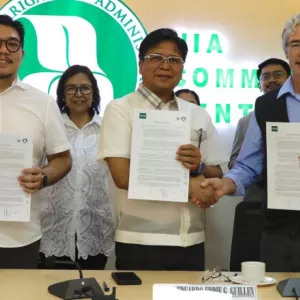NIA and IRRI promote investment-targeting solutions for sustainable rice and water management in PH
Quezon City, Philippines, (7 April, 2025) – The National Irrigation Administration (NIA) and the International Rice Research Institute (IRRI) signed a Memorandum of Agreement to implement digital innovations for increasing rice yields, optimizing water management, and reducing greenhouse gas emissions in the Philippine rice sector. Agriculture accounts for 26% of the country’s total greenhouse gas emissions, with rice production contributing

NIA and IRRI promote investment-targeting solutions for sustainable rice and water management in PH
Quezon City, Philippines, (7 April, 2025) – The National Irrigation Administration (NIA) and the International Rice Research Institute (IRRI) signed a Memorandum of Agreement to implement digital innovations for increasing rice yields, optimizing water management, and reducing greenhouse gas emissions in the Philippine rice sector.
Agriculture accounts for 26% of the country’s total greenhouse gas emissions, with rice production contributing more than half, largely due to unsustainable water management. Through the application of Artificial Intelligence (AI) and Machine Learning (ML)-Based digital innovations and a modernized, scale-specific approach to Alternate Wetting and Drying (AWD) implementation, the Closing Yield Gaps and Reducing Greenhouse Gas Emissions in the Philippine Rice Sector through Digital Innovations (Palay+) project aims to support the government’s efforts to boost rice production, enhance efficiency, and reduce methane emissions to guide smarter agricultural investments in the country.
“In this digital age, artificial intelligence is opening new doors for climate-smart farming. It not only empowers our farmers to make better decisions but also drives innovation and attracts much needed investment in the agricultural sector,” NIA Administrator Engr. Eddie G. Guillen said.
The three-year project targets to strengthen domestic rice production by integrating sustainable practices with digital solutions, capacity-building, and cross-agency collaborations in the conduct of field demonstrations to validate AI/ML-driven recommendations, identification of opportunity areas for increasing crop productivity, and the large-scale adoption of AWD practices. While ongoing studies at IRRI focus on field-level strategies for low-carbon rice, this project will expand the scope to the landscape level, ensuring broader and more impactful climate-smart solutions.
Through the development of real-time monitoring tools, local governments, and regional field offices can enhance data collection on water usage, emissions, and farming practices to enable…

